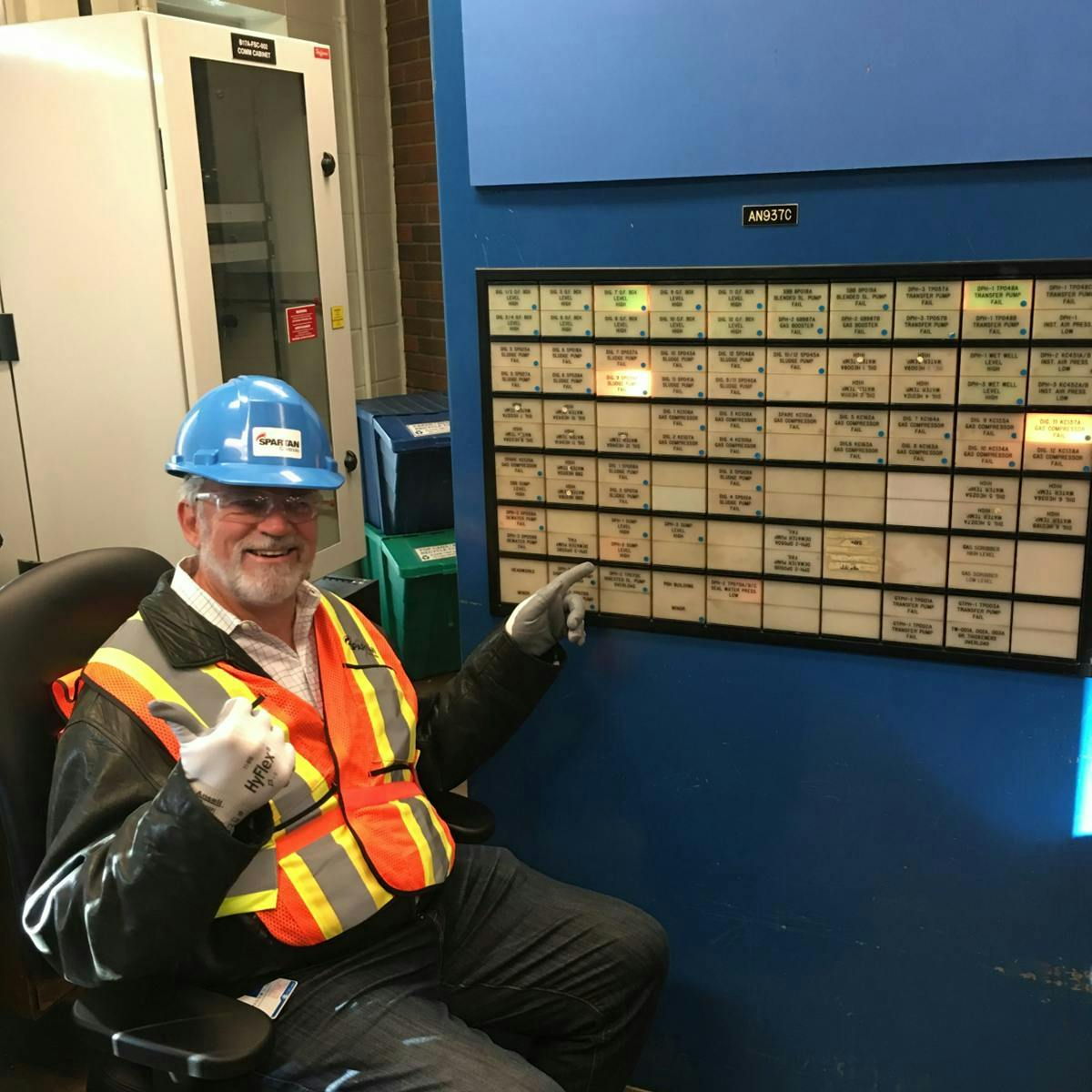Duncan Schleiss: DeltaV pioneer elected to Process Automation Hall of Fame
Why this article is important
- This article emphasizes that Schleiss' success came from working with great teams and mentors throughout his career.
- It explains how Schleiss' experience with D3 and MOD300 influenced the development of DeltaV, showing how lessons from older systems can drive next-gen solutions.
- It details how Schleiss and his team took bold steps to implement new technologies, underscoring the value of calculated risk-taking.
- It shares how engineering creativity and persistence can lead to tangible, protected contributions.
It can be a little intimidating to find yourself among people you’ve long admired, but it also makes the honor much more meaningful. Such is the case for Duncan Schleiss, longtime VP of business development at Emerson, who now adds a new title to his legacy—2025 Process Automation Hall of Fame inductee. Schleiss, who many in the industry recognize for his work as part of the development teams of some notable technologies, particularly DeltaV, admits being mentioned with some of the people he’s respected, and in some cases considers his heroes, is “nothing short of incredible.”
“I have so much respect for so many of the names [in the hall of fame],” Schleiss says. “They’re all legends in my mind.”
Schleiss now joins a peer group that not only worked with him throughout his career, but also nominated and selected him to join them in the hall of fame. He mentions members like Terry Blevins, Dave Emerson, John Berra and Greg McMillan as people who helped shape his career.
It’s no surprise that Schleiss quickly points out the work and influence of others while talking about his own induction. He considers his success the result of the great teams of colleagues and mentors he’s had. “I walk in big shoes, and I feel really humbled to be in the presence of great people in our industry,” he says.
One of those heroes is his father, a chemistry major as an undergraduate in their native South Africa. Schleiss combined his father’s chemistry influence with his own math acumen into a chemical engineering degree from the University of Natal (now KwaZulu-Natal) in Durban, before heading the U.S. to complete his master’s degree at Louisiana State University (LSU) in Baton Rouge. “LSU and Natal U were sister schools linked by the sugar industry,” he explains.
At LSU, Schleiss loved educating others, and became an assistant professor at LSU, fulfilling his career goal of becoming a teacher. “I always felt I wanted to be in the education business,” he admits. “Well, I still feel like I’m in the education business when it comes to the world of automation. After 40 years in business, you tend to know what you’re talking about.“
And he’s all too willing to pass along his knowledge to the next generation of engineers.
Building a career
These days, Schleiss has lived in the U.S. longer than he did in South Africa, but he still maintains plenty of family and work connections with his homeland. “In a strange way, it’s still my home,” he says.
Home in the U.S. is Round Rock, Texas, just outside of Austin, where he’s worked for Emerson for the last 32 years. It’s also where he’s made more than his fair share of the accomplishments that led to his selection to the Process Automation Hall of Fame. For example, he currently holds 54 patents for technologies that many of us use in our work today. “I’m very proud of those,” he says.
After graduating from LSU, he worked for EMC Controls (now Valmet), which acquired NovaTech Automation that created the D3 distributed control system (DCS) in 1982. D3 introduced the concept of unit relative operations to the process control industry, dividing processes into functional units for better control. He remembers trying to keep up with the work as a new employee. “I felt we were changing things on the fly which was pretty scary,” he remembers.
Schleiss soon left for a job at Combustion Engineering, which had just merged with Taylor to become one of the largest process instrumentation companies in the U.S. Combustion Engineering was acquired by ABB in 1989,where he became intimate with Taylor’s MOD300 system that added to his vision of the perfect DCS.
He later joined Fisher Controls, which was acquired from Monsanto by Emerson in 1992. He’s thankful that he ended up with the company and never left, like a lot of his colleagues. “It’s a good place to work and people tend to stick,” he says.
Hear more from Duncan Schleiss
Listen to the Control Amplified podcast featuring more from Duncan Schleiss on the development of DeltaV, HART fieldbus protocol, the process control industry and advice for up-and-coming process automation professionals.
Becoming a flagbearer
Schleiss isn’t shy. He knows he’s sometimes outspoken in meetings, especially when it comes to technology, but it’s also what helped him advance in his career. “I got into some meetings, where I vocalized lessons learned from D3 and Mod300. I felt the D3 system was technically superior to anything that I’d worked on,” he recalls. “I guess they thought maybe this guy can help build the next-generation system.”
He was assigned to do just that, and the result eventually became DeltaV, which integrates advanced automation solutions, real-time analytics, sophisticated control systems and lifecycle services into one platform. Of course, these days, DeltaV is a stalwart of the process control industry.
For many people, Schleiss became the unofficial face of DeltaV, but he’s again quick to humbly give more credit to the team at Emerson. “I was certainly part of a team of people that worked really hard to make it happen,” he says. “I was just one of a community, but I’m gracious to be the flagbearer.”
Developing DeltaV
DeltaV is common now, but in 1992, when Schleiss and team began development, there were several challenges to overcome. At the time, conventional wisdom said that a DCS should be Unix-based with serial communications, just as Ethernet would be hub-based, 10BaseT, though it was nowhere to be found in the industrial sector at that time.
“Serial comms was rather nice in some respects because you didn't have any electronics in the middle like we have today with Ethernet switches,” Schleiss continues. “You could do Ethernet with a ring, but then you couldn't expand it because, if you open up the ring, things fell apart.”
There was only one thought that prevailed. “We’re going to change the world,” he recalls of the team’s skunkworks-style mantra.
To do so, the team had to project what technology was coming in the next five years. It meant making big decisions, such as going with personal computers when there was only one commercial PC on the market.
That PC was from IBM and it came with the IBM OS2 operating system. “We chose not to use IBM because we found a small company called Microsoft that was working on a new platform called Windows95 and NT. “We switched from Unix, abandoned OS2, moved to Win95 on a scary decision day, and went all in, even though Win95 was a single-threaded system, and not yet nearly the powerhouse Windows it is today. We were on the inside track with Microsoft.”
Get your subscription to Control's tri-weekly newsletter.
It was a massive leap of faith. Nobody knew anything about it and the Internet didn’t yet exist, so there was no way to do research.
They also needed a PC that could run Windows, and they found it right down the street in Austin with Dell, also an up-and-coming company at the time.
Other components that contributed to the development of DeltaV were smart switches and the development of an open system that users could connect to.
“We got together with four other companies (Intellution, Rockwell, Microsoft and Opto22), and started with our flagship, proprietary, interfacing Computer Highway Interface Program (CHIP) software from our legacy DCS. Together with these partners, the ubiquitous OPC communication standard was developed, and the rest is history,” he says.
This team wasn’t without critics, facing adversity and naysayers, but still blazed their trail. “I think we got DeltaV to #1 through deep perseverance over the years,” Schleiss says proudly. “We did some really good technology things, but I said, man, we were driven in those early days when we had nothing to lose.”
Schleiss concludes, “Reflecting, while I’ve always been a visionary and driven person, I was lucky to be in the right place at the right time, when three technologies were going through an inflection point, and my company was on a mission and willing to bet on their longest shot—me.”
Read more 2025 Process Automation Hall of Fame articles here:
About the Author

Leaders relevant to this article:


